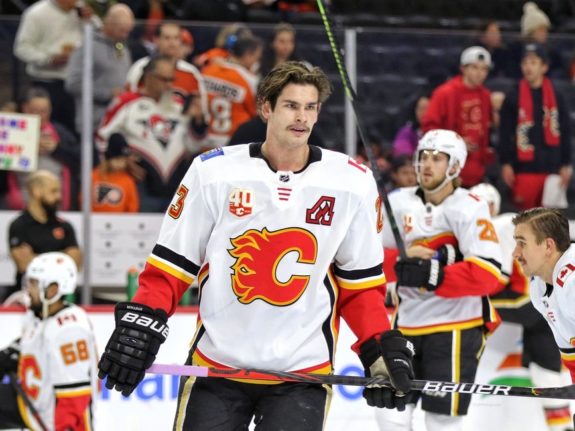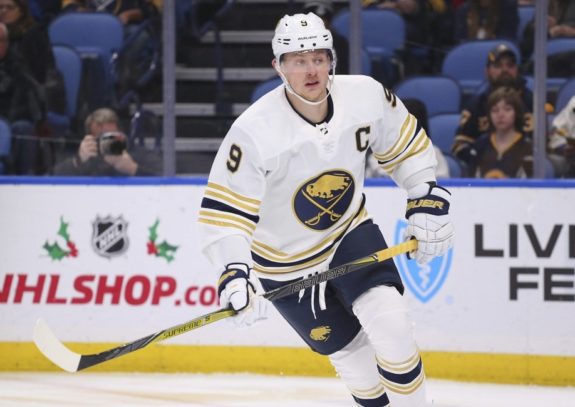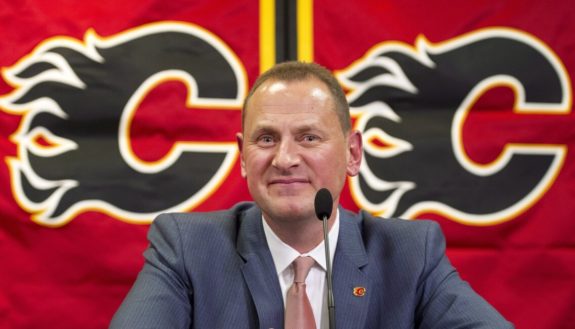The Calgary Flames were among the more active teams on the opening day of NHL free agency. With the additions of Blake Coleman, Nikita Zadorov, Trevor Lewis, and Dan Vladar, the Flames certainly addressed some holes in their roster. However, following consecutive disappointing seasons, it is hard not to be skeptical these additions are enough to push the team forward in any significant manner. The Flames have spent the last half-decade right in the mediocre middle: not a legitimate contender yet never in a prime draft position and unwilling to rebuild. The Flames have been hesitant to commit to a direction.
If they truly consider themselves a contender this season, then significant moves are still needed. Brad Treliving’s management group should be willing to go all-in on Buffalo’s star center, Jack Eichel. He is the elite talent they have been missing and unable to acquire for years. If Calgary management is content to, once again, tinker and add around the edges, then they will likely continue to yield the same lackluster results. This approach has seen the Flames advance past the first round of the playoffs only once since Treliving took over the team in 2014. The availability of Eichel presents an opportunity for the Flames to forthrightly commit to a direction and try to break the cycle of stagnation and mediocrity. Acquiring a player of Eichel’s quality should be Brad Treliving’s central goal this offseason.
A Number One Center Is Still Calgary’s Primary Need
Joe Nieuwendyk. That’s probably how far you have to go back in Flames history to find the last true number one center to lace them up at the Saddledome. The likes of Craig Conroy, Marc Savard, Daymond Langkow, and Olli Jokinen never really met the mark and were only in the role by default. Like Jarome Iginla before him, Johnny Gaudreau has played through the prime of his career without an elite linemate down the middle. Sean Monahan has been tasked with the duties for the better part of five seasons, but he has seen his play decline markedly in recent years.

The oft-injured Monahan has regressed from an impactful offensive sniper to nearly replacement level over the last two NHL campaigns. He has almost certainly been usurped by Elias Lindholm as the club’s top pivot. While Lindholm is a strong player in his own right, he also doesn’t fit the billing as a truly elite skater down the middle. It is proven to be incredibly difficult to have success in the NHL without a true number one center. The Flames’ lack of playoff success likely correlates with the plain fact they have been ailing in this position for years and have never fully addressed it.
Darryl Sutter Is Here to Win Now
It’s not like these elite centers grow on trees. Certainly, the Flames haven’t ignored this glaring weakness in conscious perpetuity. Rather, the simple truth is that players of Eichel’s caliber are not easily acquired and rarely obtainable in the open market. His availability aligning with a window in which the Flames want to be competitive drives home the notion that Calgary management needs to make this deal happen. The organization did not invest significant dollars into players such as Jacob Markstrom and Coleman, only to miss the playoffs or begin a rebuild. They clearly have aspirations of winning now.

The Flames also did not bring back coach Darryl Sutter on a multi-year deal to merely dip their toe into the pool of contention or rebuild with youth. The hiring of Sutter was a clear signal that the Flames are fully in win-now mode. It is concretely evident that the team is not rebuilding any time soon. At least while Sutter is at the helm. The coach himself proclaimed he is behind the bench with the single goal of winning the Stanley Cup.
I’m not interested in coaching just to coach. I’m coaching STRICTLY to win a Stanley Cup and that’s it. Nothing else.
Darryl Sutter, Head Coach, Calgary Flames
The team claims it wants to win now and a franchise centerman, their primary need, is currently available. If the Flames truly want to win in the immediate future, they can no longer afford to merely covet a player with Eichel’s talent. They need to finally add a player of his talent.
Brad Treliving’s Over-Patience Is Wearing Thin
One of Treliving’s strengths is his patience. However, his non-reactionary approach is also becoming one of his greatest weaknesses. For years he has expressed his belief in the core group of players despite the team yielding pretty underwhelming results, most notably in the playoffs. Some change was forced upon the Flames when they lost captain Mark Giordano to Seattle in expansion, but it is not just culture that Treliving has been hesitant to affect. He has been unable to address the team’s need for elite forward talent. The Flames were interested in Mark Stone at the 2019 NHL trade deadline, but ultimately the price was too high and they dropped from the bidding for Stone’s services.
The move seemed prudent, albeit cautious, at the time. The Flames were comfortable atop the Western Conference and did not seem to think a significant addition was necessary or worth the price. The Colorado Avalanche promptly steamrolled them in five games a few months later in round one of the 2019 Playoffs. Calgary struggled through a dismal year the next season, ultimately being ousted by the Dallas Stars in six games in the 2020 Playoffs. Following an abysmal regular season, they missed the postseason altogether in 2021.
Latest Flames Content:
- 3 Takeaways From Flames’ 4-2 Loss to the Oilers
- Projected Lineups for the Oilers vs Flames – 11/3/24
- Calgary Wranglers Start Season With a 9-Game Win Streak
- Flames’ Captain Mikael Backlund Appears in 1,000th Career Game
- 5 Takeaways From the Flames’ First 10 Games
While young defencemen Rasmus Andersson and Juuso Valimaki are solid and promising building blocks, a player of Stone’s quality surely would have propelled this team in the contending direction they claim to aspire to reach. Despite the lack of results, few significant moves have been made to improve the forward group to this point. Treliving’s ultra-cautious approach and inability to acquire elite talent have contributed to the stalling of a team that won the Western Conference a few short years ago.
Eichel Is a Franchise Player
There are certainly valid concerns about Eichel’s long-term health. However, at his best, he is a franchise center. He is the type of player that could finally propel the Flames out of the middle of the pack and into contention. Before sustaining his injury this season, the Buffalo captain racked up 160 total points in 145 games spanning the 2018-19 and 2019-2020 seasons, good for 12th overall league-wide over that time frame. Eichel managed this on a dreadful Sabres team that scored the sixth-fewest goals league-wide between 2018-2020.
Despite having little support beneath him throughout his career, the soon to be 25 year old has produced at a near point per game pace in his career and has been a top-tier offensive and defensive skater. In terms of age, Eichel is still in the prime of his career. He turns 25 in October. Selling the farm for a star player approaching 30 is not equatable to selling the farm for a star player who still should have many years of elite hockey ahead of him.
The Cost
The acquisition cost remains high and Buffalo seems to primarily be looking for draft capital and prospects. With another solid entry draft behind them, the Flames have built up a prospect pool deep enough to, at the very least, be in on the conversation. Elliotte Friedman lists the Flames as one of the clubs still engaging in talks with Buffalo. Hesitancy from other teams combined with Eichel’s camp becoming restless may open a window of opportunity for Treliving if he is willing to pay the price.
Could the Flames pull this off without giving up Gaudreau or Matthew Tkachuk? Some reports seem to indicate they could. Based on Ryan Kennedy’s information of what the Sabres were asking of the Vegas Golden Knights, it seems plausible the Flames have the capital to offer a similar prospect-heavy and draft pick-based package. Young players such as Dillon Dube and Juuso Valimaki and prospects Connor Zary and Matthew Coronato would have to be on the table.
Trelivling would also have to move out significant money in the form of an NHL roster player to take on Eichel’s $10 million salary-cap hit. This could mean either including Monahan in a deal for the Buffalo star or divesting his contract, which pays him $6.35 million against the salary cap, in a separate move. Complicating matters is the fact Monahan’s modified no-trade clause, consisting of 10 teams, kicked in this year.

It would be a complicated and costly transaction to make happen but one that, for where the Flames are situated, would be completely worth the risk and necessary to achieve the team’s goals. If the asking price does not ultimately include Gaudreau or Tkachuk, there is little excuse for Treliving not to make an Eichel deal a reality.
It Is Time for Brad Treliving to Go All In
The Flames offseason additions combined with Sutter’s season-long impact may be enough to guide the Flames to a modicum of success in the regular season and playoffs. Still, they’ve been down this path before and have yet to see significant results. They have tried peripheral offseason tinkering for years yet have not made it out of the first round since 2015. If they wish to exit the middle ground graveyard of not being good enough to contend yet being just good enough to avoid committing to a rebuild, then now is the time for Treliving to go all in and acquire Eichel. The Flames can either continue to reap the poor results of trying to contend while playing it safe, or they can break the chain.
